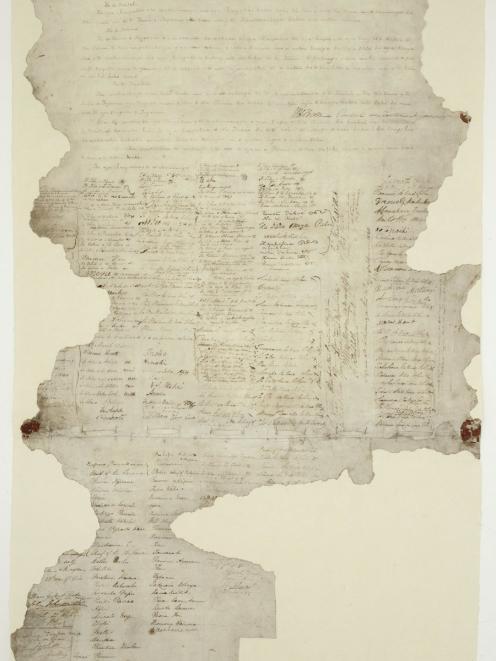
Waitangi Day has been difficult for some to celebrate as a national day because it has often attracted conflict that does not sit well with the kind of patriotic celebrations politicians and citizens yearn for when marking a national identity. It has also often troubled me that the Treaty of Waitangi has been promoted as New Zealand’s founding document when there was arguably an earlier one that announced our arrival into the modern world of nations.
If you ever read the texts of the Treaty of Waitangi you will see that it refers five times to something called Te Wakaminenga (Whakaminenga in my dialect), which the English version refers to as the Chiefs of the Confederation of the United Tribes of New Zealand.
The reason the Treaty refers to Te Wakaminenga is because the only way that the British felt that they could justifiably claim sovereignty over New Zealand, was to get this group to sign up. The issue was that the British had already recognised New Zealand as a sovereign state through the acknowledgement of the Declaration of the Independence of New Zealand, signed by a large group of northern chiefs on October 28, 1835.
James Busby, the official British representative, and a number of British missionaries had been concerned by French intentions towards New Zealand and so to head off any official claims by the French, Busby arranged for the drafting and signing of the Declaration.

The main parts of the document declare that New Zealand is an independent nation, that all sovereign power resides collectively with the chiefs, that no government can exist unless appointed by them, and that they request that the then British King, William IV, would be a protector from "all attempts upon its independence".
This the British colonial office agreed to do, so long as Maori protected British citizens living in New Zealand. It was originally signed at Waitangi by a group of 34 chiefs, with 52 chiefs from the top half of the North Island eventually signing by 1839. Given time, it is likely that it would have spread to the rest of New Zealand.
It is debatable how effective the declaration was in doing what it aspired to do, namely to set up a congress "for the purpose of framing laws for the dispensation of justice, the preservation of peace and good order, and the regulation of trade". While the 1830s had seen the end of most intertribal wars and a mass conversion to Christianity, each hapu and iwi still saw themselves as independent from every other hapu and iwi and responsible to themselves alone.
In the eyes of the British colonial office, the declaration recognised New Zealand as a sovereign and independent country. It is why when the British made up their mind to annex New Zealand and claim sovereignty by right of treaty, they first had to go Waitangi and convince the signatories of the Declaration to sign up.
On February 6, 1840, when Hobson got the first 40 chiefs to sign the Treaty of Waitangi, his satisfaction was not on getting any 40 chiefs to sign, but that 26 of them were already half of the 52 who committed to the declaration.
Some may dismiss the declaration because it did not lead to a national Maori government in the five years before the signing of the Treaty of Waitangi. But, these type of documents nearly always take time to be implemented. The American Declaration of Independence signed in 1776 took until 1789 to lead to a fully formed government. The Magna Carta signed in 1215 took another 20 years or so to create parliament and a further 60 years before it was affirmed in law. Even with the Treaty of Waitangi, it took 14 years for the British to set up a parliament in New Zealand.
With Waitangi Day often so fraught as a national celebration, maybe October 28 could be our true national day, because as even the Treaty of Waitangi implies, the Declaration was our true founding document.
I am not suggesting we remove Waitangi Day or add yet another public holiday.
I did suggest to my father that we could swap it for Labour Day, but as a committed trade unionist he objected and said Labour Day was for the workers. We could, however, swap it for King’s Birthday, which was possibly originally meant as a national day. We have Matariki at that time of the year now and so swapping a winter holiday for a spring holiday is reasonable.
Moreover, it would create a genuine opportunity to celebrate the actual founding day of our shared country.
— Anaru Eketone is an associate professor in social and community work at the University of Otago.











